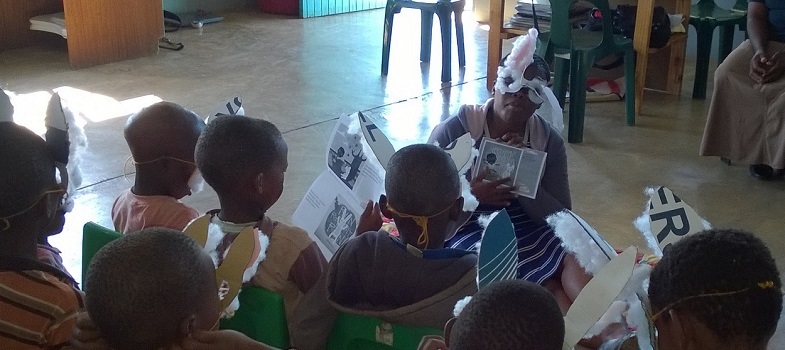A question of language
By the time they leave primary school, many African children are being taught in English. In recent years, however, it has been suggested that children should be taught to read and write in their home language, making the transition to English in around Grade 4. There is convincing evidence that children who can read in their home language progress much faster in English, and are more likely to be successful in later years of schooling (Kioko et al., 2014).
When children learn to read and write in their own language, they learn more quickly. This is because they are already competent speakers of their home or first language. They can use their first language knowledge to predict or make ‘educated’ guesses of the meanings of a new language. In this way children are more likely to become natural writers and readers, just as they are natural speakers. This means that it is easier for teachers to design active lessons that link learning in school to children’s home life.
Teachers are also more flexible and creative when they can use their first or home languages with their children. Research has shown that teachers who use only the school’s medium of instruction are less active and creative in their teaching (Barrett et al., 2007).
There is much evidence that flexibility in moving between home language and other languages allows teachers and children to maximise understanding and participation (for example, see the OpenLearn course Language as a medium for teaching and learning [Tip: hold Ctrl and click a link to open it in a new tab. (Hide tip)] .
Learning other languages is easier when literacy is first firmly established in the most familiar language (Cummins, 2001; Unicef, 2016). Academic research also documents the advantages for the brain and education when children learn to read in their most familiar language (Ouane & Glanz, 2011).
Activity 1.5: Reflecting on ‘A question of language’
Record three things from the reading in your study notebook that you either found interesting or that was new information to you.
You are now going to apply your knowledge from the reading to analysing a case study (Case Study 1.1) about the importance of the home language in supporting children’s early reading, and then try the activity that follows it. We suggest you try this with a colleague, if possible.
Case Study 1.1: Home language in early reading
Mr Shabukali’s son, Matson, has just started school in Lusaka. Mr Shabukali is concerned that Matson is being taught to read in their home language of Nyanja – he had expected that Matson would learn to read English. He has gone to the school to meet the headteacher.
Activity 1.6: Home language or English?
Having read the case study, imagine you are the headteacher. Write a short paragraph explaining to Mr Shabukali why you are teaching Matson to read in Nyanja. Draw on your own experience, your response to Activity 1.5 and the notes you made in your study notebook.
Optional readings: If you are interested in learning more about the importance of home language learning there are two studies you can read.
You can download a major UNESCO study on the issue. Pages 22–3 have an executive summary that is easy to digest. The conclusion and recommendations (p. 214) might also be of interest.
A Multilingual Education article that documents success stories from Africa in which mother tongue education has brought educational and economic benefits.
Optional activity: You may also want to download and read an OER on a multilingual classroom from the TESS-India project.
Our approach to learning and teaching early reading



